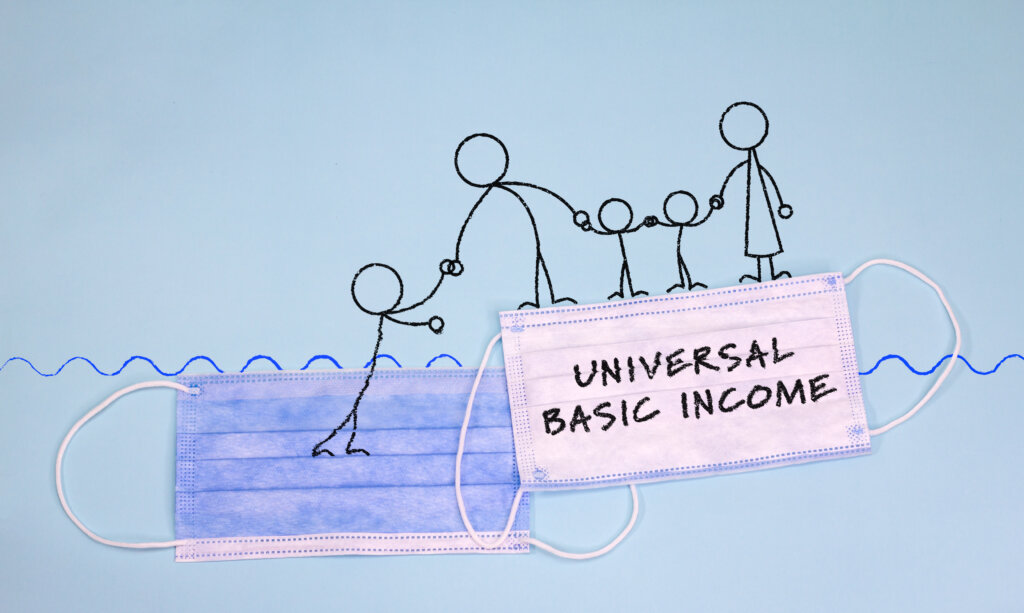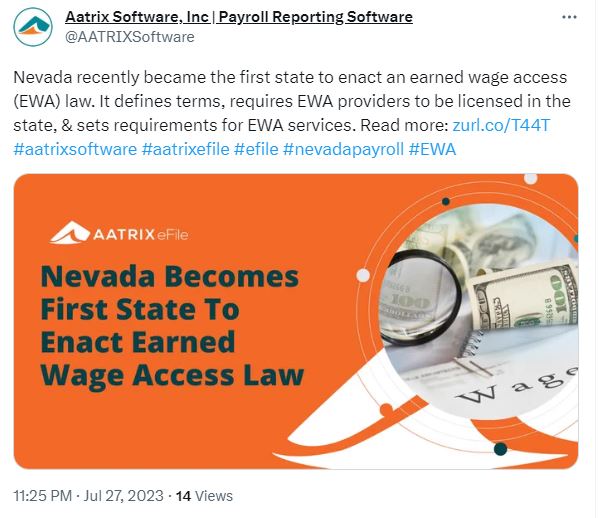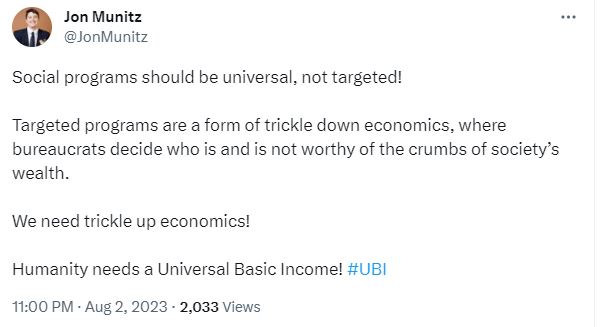
Can earned wage access be adopted into universal basic income distribution? (Image – Shutterstock)
Can earned wage access be a catalyst for universal basic income?
The World Bank defines universal basic income as a transfer that is provided universally, unconditionally and in cash by the government. However, some scholars and economists feel that the universal basic income is not a “means-tested” service based on additional needs or dependent on a particular behavior.
According to researchers at Northumbria University in Newcastle, unlike most existing welfare systems, universal basic income does not look into changes in society, such as the COVID-19 pandemic, inflation and such. As such, the impact of universal basic income would depend on the economy.
In fact, the World Bank feels that universal basic income is “poised to mitigate the effects of purported massive job losses from automation, streamline the chaotic plethora of state-provided schemes, or empower people by redirecting natural resource–related revenues from public coffers to citizens.”
But here’s where the problem lies: Not all countries are offering universal basic income. A report by the IMF stated that “discussions around universal basic income can be heated, both in a scholarly context and in public discourse, and there is no established common understanding. Very different income-support programs are often labeled universal basic income, even when they have little in common or do not aim at the same goal.”
This year, The Guardian reported that England will trial a universal basic income of £1,600 a month for the first time in a pilot program. Thirty individuals will be paid a lump sum without conditions each month for two years and will be observed to understand the effects on their lives.
As the study kicks off, there is actually another method that governments can consider to offer universal basic income. Currently, the process is a lump sum payment being given out each month. While there is a guaranteed amount each month, there are always concerns about the need for funds throughout the month for unplanned expenses.

England is having a trial for universal basic income. (Image – Shutterstock)
A different approach to universal basic income
Now, imagine if there is an option whereby a certain amount of the allocated funds can be made available to individuals whenever they need it throughout the month. It could be of great help to those who are having financial difficulties, especially with the rising cost of living.
For example, a universal basic income recipient requires additional funds to fix his car. Instead of having to pay in credit, borrow and delay his vehicle repairs till he has access to funds, he could just apply for a small amount from his universal basic income to be advanced to him for this particular purpose. This would actually make a big difference to the user.
This practice is already available in some companies. Known as earned wage access, employees are given the opportunity to access a portion of their earned salary before their scheduled paydays. It is important to note that earned wage access is not a form of debt. Instead, employees can access their earned wages without incurring interest or fees. The amount they can access is also limited to a percentage of their earned salary.
In the US, Nevada became the first state to enact an earned wage access law. It defines terms, requires earned wage access providers to be licensed in the state, and sets requirements for earned wage access services. It states that the services, provided by a licensee in compliance with the law, are not considered a loan. Missouri is the second state to also enable the act.

Nevada is the first state in the US to implement laws for earned wage access.
The rise of earned wage access
While the entire process may sound complicated, technology has actually simplified the entire process. Today, organizations considering offering earned wage access to their employees simply need to work with a technology provider is preparing the solution for employees.
Globally, there are several earned wage access providers. Here’s a look at some of the major tech companies offering the service.
- DailyPay – A fintech unicorn and the biggest earned wage access provider in the US, DailyPay enables companies to offer on-demand pay. The process to implement on-demand pay by DailyPay is seamless and straightforward. The technology integrates effortlessly with existing HCM systems with no changes to any element of the payroll process.
- Revolut – Its On-Demand Pay is a product that allows employees to access wages as they earn them, instead of just being paid a lump sum at the end of the month. Once a company onboards Revolut, its employees can have access to funds earned during a period of time during which they’ve agreed with their employer. It’s not an advanced salary, but just being paid based on the work done. For example, if an employee has worked for 2 weeks and requires funds, he will only get access to funds that total 2 weeks of work.
- Paywatch – The South Korean earned wage access provider partners with banks and employers to deploy funds. As Asia’s first bank-backed earned wage access solution, Paywatch aims to provide these individuals and the companies they work for with an earned wage access option that gives workers access to the banking system and safeguards them from predatory practices. Paywatch is currently available in South Korea, Malaysia, the Philippines and Hong Kong with services in Indonesia expected to be launched soon.
- GajiGesa – The first company in the Asia Pacific to launch earned wage access on WhatsApp in Indonesia, enabling more employees across the country to seamlessly access their accrued salaries anytime and anywhere, in seconds, at the push of a button. GajiGesa currently partners with over 300 enterprises and serves over 750,000 employees.

Another Tweet on the impact of universal basic income.
Earned wage access in Southeast Asia
Tech Wire Asia caught up with Richard Kim, the CEO of Paywatch recently to get his views on earned wage access (EWA) in Southeast Asia. Paywatch recently expanded its core team in Malaysia and the region as they prepare to launch in the Philippines in the fall, with Indonesia to follow shortly thereafter.
The company also recently signed on former CEO and founder of DailyPay, Jason Lee, as an Executive Partner. Kim expects Lee’s guidance to give Paywatch a major competitive edge in the region.
TWA: What trends are you noticing in EWA currently? Is there an increased demand for it in Southeast Asia? Why?
There is an increasing demand for accessible financial solutions across Southeast Asia – especially among the lower-income workforce – and I don’t foresee this changing anytime soon, amidst the fight against inflation and the rising cost of living. Many of these individuals are underbanked and thus vulnerable to predatory lending practices.
Overall, a growing focus on affordability and financial inclusion has contributed to the heightened demand for EWA solutions as companies are recognizing the need to support their employees’ financial well-being.
TWA: Where does Paywatch fit among EWA providers in the region currently? As they are backed by a bank, does it give them an advantage compared to other providers?
Paywatch stands out due to its unique backing by banks, which provides several advantages, including enhanced regulatory compliance, seamless fund transfers, and a strong foundation of trust. By aligning with banks, Paywatch can leverage its established infrastructure and expertise in financial services to deliver a robust and secure EWA solution, as well as provide individuals with access to banks, safeguarding them from illegitimate lenders.
Our partnership with banks also ensures that employers are given fair pricing and consumer protection for their employees – and at RM 1 per withdrawal, we provide the most competitive withdrawal rates in Malaysia. After all, this is not a loan or a salary advance, EWA is money the employees have already earned and belongs to them. By right, employees should access their earned wages without incurring excessive fees.
TWA: How can companies pick the right EWA to partner with? And how should they implement EWA for their employees?
There are several factors to consider, including the provider’s reputation, track record, and compliance with local regulations. It is essential to evaluate technical capabilities, integration options with existing HR or payroll systems, and user experience through intuitive mobile applications.
Additionally, understanding the fee structure, customer support, and scalability of the EWA solution is crucial. Once a suitable provider is identified, implementing EWA for employees involves educating them about the benefits, ensuring seamless onboarding, and providing ongoing support to address any queries or concerns.
TWA: Inflation is becoming a big problem in Southeast Asia. The Philippines and Indonesia are also experiencing high inflation. How can employers be sure that EWA will not impact employee performance? For example, employees may tend to overspend when having access to funds and be short in paying bills when due, which may lead to a drop in work productivity and such.
While there may be concerns about EWA impacting employee performance, the effect is actually the opposite. Our clients have seen that employees are actually more productive, with better attendance, better retention and stronger results in recruitment drives, when EWA is used correctly. Taking care of the employees financially and reducing their financial stress helps with productivity.
Moreover, we encourage employers to emphasize responsible financial management, encourage budgeting practices, and provide educational resources to help employees make informed decisions. Paywatch recently took a step forward by offering financial education resources in partnership with Visa on the platform, giving employees and employers access to information on better money management to support their EWA use.
Paywatch also collaborates with employers to set spending limits or implement features that promote prudent financial behavior. At Paywatch, the withdrawals are broadly capped at 50% of monthly earnings – although this can be adjusted with the employer – striking a balance between employee financial empowerment and overall productivity.
A catalyst for universal basic income
So can the technology for earned wage access be applied to universal basic income programs?
While universal basic income is offered by governments, there is no reason why this method would not work. The beauty of earned wage access is that it can be customized specifically to an organization’s payment structure. Hence, it can definitely work for governments as well.
There is no doubt that there will be criticisms if governments implement such a move. Many would feel that by enabling earlier withdrawals of funds, recipients would not be able to cope in the future. This is why the technology of earned wage access is designed to be approved based on a use-case basis.
Requests for early access to funds can be automated and determined through AI algorithms. Some non-banks are already using AI to analyze the financial history of applications for loans and such. For earned wage access, the same functions can be applied to analyze the spending of an applicant before approval for example.
At the end of the day, universal basic income keeps the economy going and earned wage access could be the best method in providing funds to those who really need financial assistance.
READ MORE
- 3 Steps to Successfully Automate Copilot for Microsoft 365 Implementation
- Trustworthy AI – the Promise of Enterprise-Friendly Generative Machine Learning with Dell and NVIDIA
- Strategies for Democratizing GenAI
- The criticality of endpoint management in cybersecurity and operations
- Ethical AI: The renewed importance of safeguarding data and customer privacy in Generative AI applications




